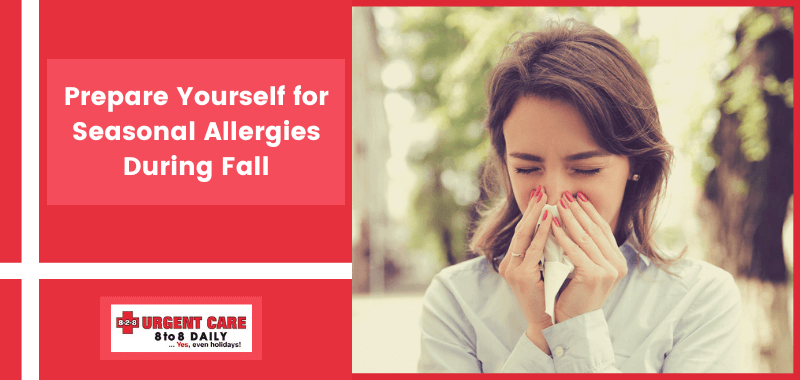


Have you ever experienced sudden sneezing or congestion? You may have been exposed to an allergen that triggers your immune system to react in such a way as to get rid of it from your nose and throat. Several things can cause allergic reactions, and there’s no permanent cure for them. In the US alone, more than 50 million people suffer from allergies, and they are the sixth leading cause of chronic illness as well.
In severe cases, such as anaphylaxis (severe and rapid allergic reaction caused by a bee sting, medicines, or peanuts), allergies can also lead to death. Children are often most vulnerable to such complications arising from an allergic reaction. Allergic reactions can also be caused by seasonal changes, and they are most common in fall and spring. Since many people are unaware of their triggers for allergic reactions, it’s important to learn about prevention tips and treatment options in case an emergency arises.
Seasonal allergy, also known as seasonal allergic rhinitis or hay fever, is a specific allergy that occurs in a particular season due to an external allergen, such as pollen. Seasonal allergy is mostly visible in the hay-cutting season; hence, it is called hay fever. Depending on the triggers and surrounding environment, one may experience hay fever in more than one season, but they are least expected during the winter and get worse during fall and spring.
Fall season allergy is triggered by ragweed, while trees and grass pollen trigger spring seasonal allergy. Ragweed is also the reason why these allergies get worse during the fall. Ragweed releases pollen between August and November, with mid-September being the peak. In early October, these pollens are carried by rain and wind into our houses, and our clothes and this can cause allergy symptoms. Since the fall season is already here, let us talk about the fall seasonal allergy in more detail.
The most common cause for fall season allergies is ragweed, a plant that grows wildly on the East Coast and in the Midwest. Though it starts to release pollen with nights and warm days during August, it can last up to September and October. Apart from ragweed, some people who are allergic to certain fruits and vegetables, including bananas and melon, can also suffer from seasonal fall allergies. Other causes may include the following:
Apart from plants, dust mites and rain can also give birth to molds during fall, and they can get stirred into the air as well as your house. Being exposed to them can trigger mild allergic symptoms such as sneezing and runny noses.
The symptoms of allergies during the fall season include:
As mentioned earlier, there is no cure for allergies, but these tips can help reduce symptoms of fall allergies.
After spending time outdoors, be sure to clean your hands and face thoroughly, which will help eliminate lingering pollen.
It is not just skin; pollen settles on clothes too. In addition to cleaning your hands, face, and body, it is important to change clothes that have pollen on them, which will keep the symptoms away.
Covering your mouth and nose with a protective mask can prevent pollen contraction. Wearing an N95 mask for outdoor chores and activities can protect you from different allergens.
If possible, avoid outdoor chores that kick up allergies, like weed pulling and raking leaves.
Open windows during fall bring ragweed pollen. When allergies are high in the fall, use the home’s air conditioner or heat.
Using a high-efficiency particulate air (HEPA) filter can help keep indoor allergens outside your home, improving the overall air quality and saving you from allergic reactions.
Over-the-counter nasal saline solution is one of the best remedies for reducing pollen from your nasal lining and can provide great relief from sudden allergic complications.
If you are experiencing any acute symptoms other than just mild fever or runny nose, then it is recommended to talk to your doctor or local urgent care immediately. If you are experiencing anaphylaxis or breathing problems, you should call 911 immediately. Other allergic symptoms that require medical attention include, severe abdominal pain, vomiting, diarrhea, chest pain, severe anxiety, dizziness, swollen eyes, mouth, tongue, or throat, and discoloration including rashes or skin turning blue or pale.
Not all allergies can be treated with home remedies. Some allergies are extremely severe and fatal. Urgent intensive care may be needed for quick treatment in many cases.
If you or your loved ones suffer from serious seasonal allergic symptoms, visit your nearest 8-2-8 Urgent Care clinic in Oceanside, CA. Our experienced staff and providers will address you in no time if you are experiencing a serious allergic reaction. With our advanced infrastructure and personal care, we have successfully treated extreme cases of seasonal allergies, including fall allergies. If you are experiencing severe reactions such as difficulty breathing or swollen tongue you should immediately go to the ER or call 911.
We have many patients that are unsure of what to do in these situations and we can assess and take care of the mildest allergy symptoms to life-threatening reactions. We are equipped to stabilize you in these severe cases. If you are not sure please call our center at 760-216-6253. 8-2-8 Urgent Care also provides our patients with a convenient self-check-in on their mobile devices. Just call from the comfort of your home, and our staff will check you in and call you when we have a treatment room ready for you.